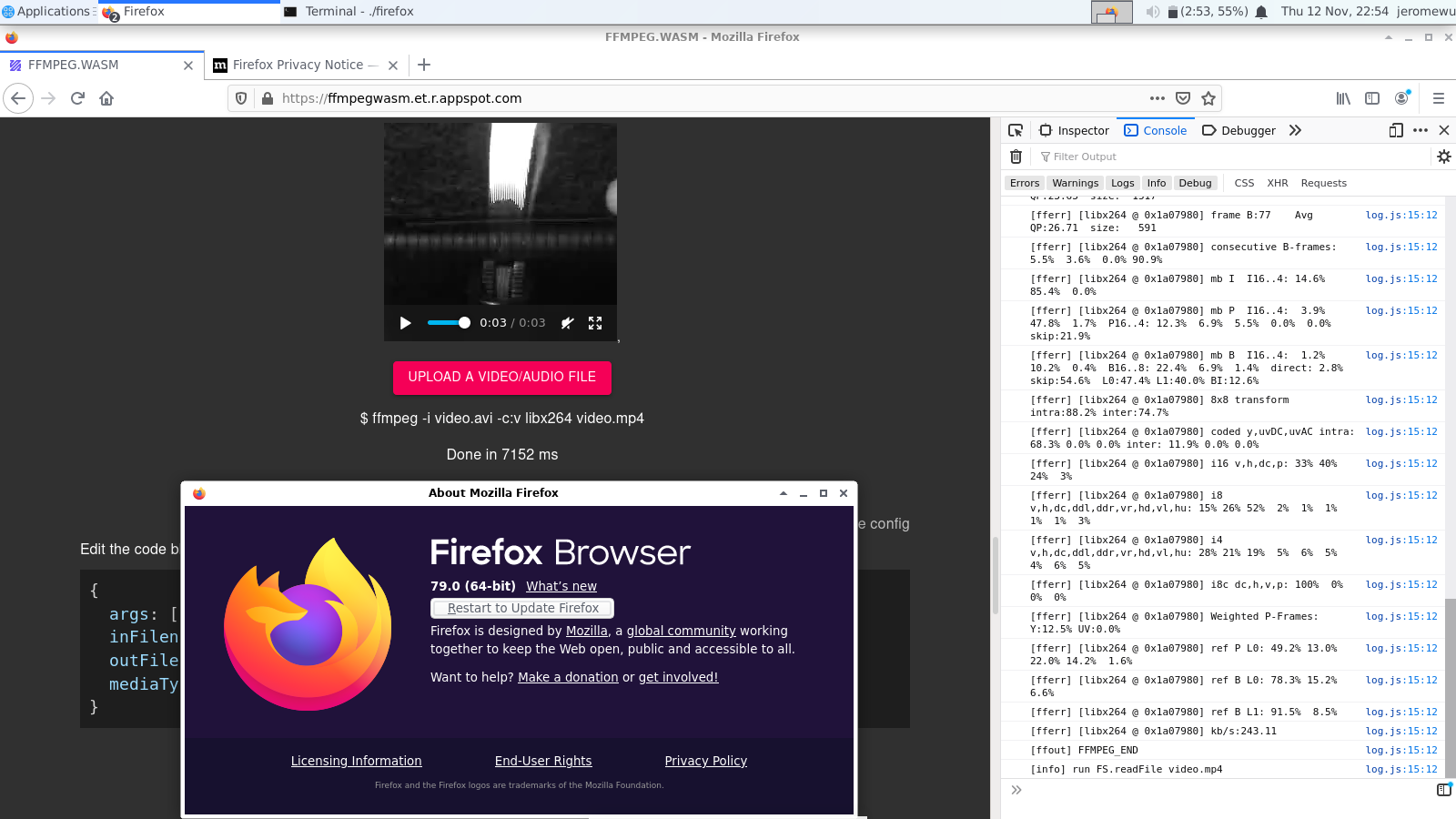ffmpeg.wasm
ffmpeg.wasm is a pure Webassembly / Javascript port of FFmpeg. It enables video & audio record, convert and stream right inside browsers.
AVI to MP4 Demo
Try it: https://ffmpegwasm.github.io
Installation
Node
$ npm install @ffmpeg/ffmpeg @ffmpeg/core
As we are using the latest experimental features, you need to add few flags to run in Node.js
$ node --experimental-wasm-threads --experimental-wasm-bulk-memory transcode.js
Browser
Or, using a script tag in the browser (only works in some browsers, see list below):
<script src="https://unpkg.com/@ffmpeg/ffmpeg@0.9.5/dist/ffmpeg.min.js"></script>
<script>
const { createFFmpeg } = FFmpeg;
...
</script>Only browsers with SharedArrayBuffer support can use ffmpeg.wasm, you can check HERE for the complete list.
Usage
ffmpeg.wasm provides simple to use APIs, to transcode a video you only need few lines of code:
const fs = require('fs');
const { createFFmpeg, fetchFile } = require('@ffmpeg/ffmpeg');
const ffmpeg = createFFmpeg({ log: true });
(async () => {
await ffmpeg.load();
ffmpeg.FS('writeFile', 'test.avi', await fetchFile('./test.avi'));
await ffmpeg.run('-i', 'test.avi', 'test.mp4');
await fs.promises.writeFile('./test.mp4', ffmpeg.FS('readFile', 'test.mp4'));
process.exit(0);
})();Use other version of ffmpeg.wasm-core / @ffmpeg/core
For each version of ffmpeg.wasm, there is a default version of @ffmpeg/core (you can find it in devDependencies section of package.json), but sometimes you may need to use newer version of @ffmpeg/core to use the latest/experimental features.
Node
Just install the specific version you need:
$ npm install @ffmpeg/core@latestOr use your own version with customized path
const ffmpeg = createFFmpeg({
corePath: '../../../src/ffmpeg-core.js',
});Browser
const ffmpeg = createFFmpeg({
corePath: 'https://unpkg.com/@ffmpeg/core@0.8.5/dist/ffmpeg-core.js',
});For the list available versions and their changelog, please check: https://github.com/ffmpegwasm/ffmpeg.wasm-core/releases
Multi-threading
Multi-threading need to be configured per external libraries, only following libraries supports it now:
x264
Run it multi-threading mode by default, no need to pass any arguments.
libvpx / webm
Need to pass -row-mt 1, but can only use one thread to help, can speed up around 30%
Documentation
FAQ
What is the license of ffmpeg.wasm?
There are two components inside ffmpeg.wasm:
- @ffmpeg/ffmpeg (https://github.com/ffmpegwasm/ffmpeg.wasm)
- @ffmpeg/core (https://github.com/ffmpegwasm/ffmpeg.wasm-core)
@ffmpeg/core contains WebAssembly code which is transpiled from original FFmpeg C code with minor modifications, but overall it still following the same licenses as FFmpeg and its external libraries (as each external libraries might have its own license).
@ffmpeg/ffmpeg contains kind of a wrapper to handle the complexity of loading core and calling low-level APIs. It is a small code base and under MIT license.
Can I use ffmpeg.wasm in Firefox?
Yes, but only for Firefox 79+ with proper header in both client and server, visit https://ffmpegwasm.et.r.appspot.com to try whether your Firefox works.
For more details: ffmpegwasm#106
What is the maximum size of input file?
2 GB, which is a hard limit in WebAssembly. Might become 4 GB in the future.
How can I build my own ffmpeg.wasm?
In fact, it is ffmpeg.wasm-core most people would like to build.
To build on your own, you can check build.sh inside https://github.com/ffmpegwasm/ffmpeg.wasm-core repository.
Also you can check this series of posts to learn more fundamental concepts:
- https://jeromewu.github.io/build-ffmpeg-webassembly-version-part-1-preparation/
- https://jeromewu.github.io/build-ffmpeg-webassembly-version-part-2-compile-with-emscripten/
- https://jeromewu.github.io/build-ffmpeg-webassembly-version-part-3-v0.1/
- https://jeromewu.github.io/build-ffmpeg-webassembly-version-part-4-v0.2/







